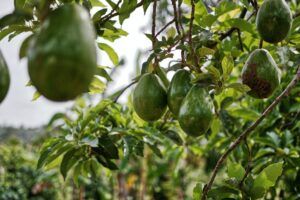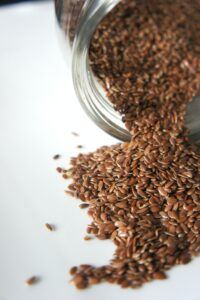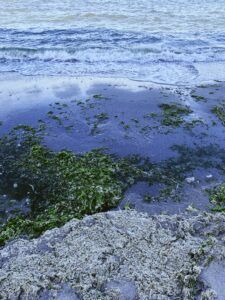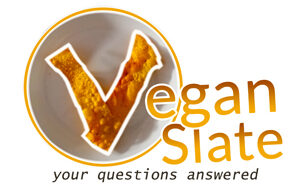 (This post was originally published on May 8, 2021 at 10:06 and updated with extra sources on April 21, 2022 at 07:30)
(This post was originally published on May 8, 2021 at 10:06 and updated with extra sources on April 21, 2022 at 07:30)
You probably already know Omega 3 fatty acids are vitally important ‘good’ fats that are conclusively proven to provide a whole host of major health benefits. So knowing which vegan Omega 3 food sources are best to go for is important in this brave new world!
There’s a very good reason vegans are known to devour whole avocados at will … personally, I like to remove the skin first 🙂
Getting Enough Omega 3 as a Vegan – The Problem
Without getting too scientific, let’s look at the challenge faced by those of us following a plant-based, vegan lifestyle when it comes to getting enough of these essential fatty acids in our diet. You may be surprised to learn there are actually eleven different types of Omega 3 [1] but the most important, by far, are the three you often hear about. Namely ALA, DHA and EPA.
Vegan Omega 3 food sources predominately contain ALA (alpha-linolenic acid), while EPA (eicosapentaenoic acid) and DHA (docosahexaenoic acid) are the main constituent of animal based sources such as oily fish. They are referred to as ‘essential’ fatty acids because the body is unable to make them [2] but they are known to be vital for good health. So we have to get Omega 3 in our diet.
 When you were growing up your Mother may have tried to force cod liver oil down your throat. I know mine did and now I’m scarred for life! Of course, I’m kidding but there’s a reason we went big on fish oil back then. ALA is not as active in the body and needs to be converted to DHA and EPA. Unfortunately, this conversion process is not all that efficient with only around 5% of ALA converted to EPA and a measly 0.5% ends up as DHA [3] – although some studies do suggest significantly higher conversion ratios.
When you were growing up your Mother may have tried to force cod liver oil down your throat. I know mine did and now I’m scarred for life! Of course, I’m kidding but there’s a reason we went big on fish oil back then. ALA is not as active in the body and needs to be converted to DHA and EPA. Unfortunately, this conversion process is not all that efficient with only around 5% of ALA converted to EPA and a measly 0.5% ends up as DHA [3] – although some studies do suggest significantly higher conversion ratios.
So therein lies our problem. Even the richest vegan Omega 3 food sources can have a limited effect on your health due to this inefficient conversion. Consequently, you need to consume much more plant-based Omega 3 to get the same effect as that delicious cod liver oil your Mother used to insist you dosed up on 🙂
An avocado a day keeps the doctor away … or maybe 5 avocados!
Don’t worry though, there is a shiny silver lining to this story … read on …
The Best Vegan Omega 3 Food Sources
Before we hit the mother lode let’s run through some of the richest vegan Omega 3 food sources which you will want to incorporate into your diet on a daily basis. In no particular order …
- Perilla Oil
Cultivated widely in India, Korea, Southern Asia and China, the perilla plant is a member of the mint family and common in the cuisine from these parts of the world. The seeds are pressed into an oil which is very rich in Omega 3. A recent study estimated this oil comprised of up to 64% ALA [4] … and of course, it’s vegan. - Walnuts
 As vegan Omega 3 food sources go, walnuts are right up there and they pack a punch comprising around 65% healthy fats. They are loaded up with Omega 3’s and you only need to eat a small handful to get your daily requirement. I like to grind up walnuts and sprinkle over my porridge in the morning.
As vegan Omega 3 food sources go, walnuts are right up there and they pack a punch comprising around 65% healthy fats. They are loaded up with Omega 3’s and you only need to eat a small handful to get your daily requirement. I like to grind up walnuts and sprinkle over my porridge in the morning. - Avocado
We all know how vegans love avocados! It’s the media’s go-to when both endorsing or deriding the vegan lifestyle, whichever the particular direction of news is that day! But I digress. There’s a very good reason the avocado figures highly in a healthy vegan diet – they are brimming with Omega 3 fatty acids. In the form of ALA, these ‘good fats’ account for approximately 75% of the calories in an avocado. I try to eat at least half an avocado every day and I’m convinced it’s been pivotal in keeping me healthy on my vegan journey! - Brussels Sprouts
Love ’em or hate ’em, brussels sprouts are another fantastic source of Omega 3. Personally, I love ’em 🙂 Who would’ve thought, the humble Brussels sprout is one of the best vegan Omega 3 food sources with 200 – 400mg of ALA per 1.5 cup serving. This is around 27% for women and 19% for men, of your recommended daily intake. I like to slice them in half and quick fry with garlic, pop on a slice of toast with cracked pepper and salt … delicious! - Chia Seeds
Small but full of goodness, chia seeds contain a huge amount of Omega 3. Just half an ounce (14g) of good quality chia seeds can contain as much as 2,300mg of ALA which is well over the levels some respected authorities suggest you should consume every day. They have numerous other health benefits too being chock-full of essential nutrients and anti-oxidants. Crucially, for vegans, they also contain a lot of protein. In fact, around 14% of the seed is high-quality protein. Use them in smoothies, muesli, porridge, salads. They are amazing! - Hemp Seeds
Another giant of the Omega 3 world, hemp seeds are bursting with the stuff. If you thought chia seed is good then a comparable weight of hemp seeds, ie: 14g gives you around 3000mg of ALA which is even more, weight for weight! You can incorporate hemp seeds into your vegan diet easily, in much the same way as with chia seed. Whizz up with a smoothie, sprinkle over your muesli and add to fresh salads for a nutty crunch. Hemp seed is one of my all time favourite vegan Omega 3 food sources … I just love the taste! - Flaxseeds
Last, but by no means least, is the flaxseed which actually contains even more Omega 3 ALA than hemp seeds! As with hemp seed, there is a good amount of protein, fibre, magnesium and other trace elements in flaxseed. There really is no need to worry about getting enough good fats in a vegan diet with all these abundant sources in nature. Again, with a 14g serving of flaxseed you will be getting around 3,100mg of ALA Omega 3 which is pretty much twice the recommended intake for men on a daily basis and well over 200% more for women 🙂 Flaxseed is the don and you can use it the same as the other seeds above.
Plant-Based Omega 3 Sources vs Fish-Based Sources
 As mentioned above, your body needs to convert the ALA you consume into DHA and EPA to gain the full health benefits of this essential dietary requirement. This process is very inefficient, especially for DHA. Most of us know fish oil is a very popular health food supplement and this is because oily fish contains high levels of DHA and EPA.
As mentioned above, your body needs to convert the ALA you consume into DHA and EPA to gain the full health benefits of this essential dietary requirement. This process is very inefficient, especially for DHA. Most of us know fish oil is a very popular health food supplement and this is because oily fish contains high levels of DHA and EPA.
Following a vegan diet can result in low levels of DHA in the body which has been shown to be important for foetal brain development among other numerous other benefits. But guess what? The fish get their EPA and DHA from somewhere as it is found in high concentrations in many oily fish.
Incidentally, I found it fascinating to learn there is much debate around the evidence that a significant turning point in the evolution of the human brain coincides directly with a period in history when humans started to increase the exploitation of the resources found around the coasts and inland waterways [5].
The argument is that since all life originated in the sea, we are inextricably linked to some nutrients which are abundant in the ocean. DHA being one of these.
While the evidence does strongly support the idea that brain size increased due to this there is a more subtle school of thought suggesting human brain evolution occurred over a much longer time frame as humans naturally increased the variety in the diet.
Nevertheless, it does seem that increased levels of EPA and DHA in the diet “opened the floodgates” for brain evolution!
So, vegans should take note and recognise that a good supplement with DHA and EPA is highly recommended.
Cut Out the Middleman – All Hail the Algae
 There is another source of vegan Omega 3 which delivers not the ALA form found in all the plant sources above, but contains the DHA and EPA so richly sourced in oily fish. It’s pretty simple and highly logical. The fish eat large quantities of algae … the algae contains the Omega 3s.
There is another source of vegan Omega 3 which delivers not the ALA form found in all the plant sources above, but contains the DHA and EPA so richly sourced in oily fish. It’s pretty simple and highly logical. The fish eat large quantities of algae … the algae contains the Omega 3s.
So possibly the best vegan Omega 3 food sources high in the DHA and EPA types we need to stay optimally healthy are the algae oils and seaweed products which you can find in most good health food stores these days.
The oceans have provided for us for millennia and they can continue to do so if we can just get a handle on how to live sustainably. Look for sustainably sourced algae and seaweed products and use in your cuisine regularly or just take supplements. Either way you’ll be getting the DHA and EPA we all need, vegan or not.
Seeds, Nuts, Avocados and Algae!
It makes me chuckle when people ask me, “so what do you eat as a vegan?”. They honestly believe it’s just lettuce! There are so many fruits and vegetables out there with everything we need to flourish on a vegan diet. Mother nature provides it all without the need to take the life of another sentient being.
I hope you’ve enjoyed this article and will now go forth into the wilderness to forage and gather your Omega 3 rich foods using your new-found knowledge … or just go to the shops and buy some avocados 🙂
Thanks for reading 🙂
Rohan
References: (click the back button to return to your position in the text)
- ‘Omega-3 fatty acid‘ – Wikipedia @ 27th June 2021.
- ‘Omega-3 Fatty Acids: An Essential Contribution‘ – Harvard TH Chan School of Public Health 2012-09-18T17:30:03+00:00.
- Burdge GC. Metabolism of alpha-linolenic acid in humans. Prostaglandins Leukot Essent Fatty Acids. 2006 Sep;75(3):161-8. doi: 10.1016/j.plefa.2006.05.013. Epub 2006 Jul 7. PMID: 16828546.
- Asif, M. Health effects of omega-3,6,9 fatty acids: Perilla frutescens is a good example of plant oils. Orient Pharm Exp Med 11, 51–59 (2011). https://doi.org/10.1007/s13596-011-0002-x
- Bret Stetka. Scientific American. March 1, 2016. By Land or by Sea: How Did Early Humans Access Key Brain-Building Nutrients? https://www.scientificamerican.com/article/by-land-or-by-sea-how-did-early-humans-access-key-brain-building-nutrients/

Thanks for this very informative post on omega 3 sources.
I like that you have given me so many sources to choose from. There are definitely some ideas and sources that I can easily increase in my diet. I certainly will try the ideas of crushing walnuts and putting them on my cereal, as it is probably the easiest and quickest way to get more omega 3 into my diet.
Hey Geoff. Thanks very much for reading and I’m glad you found my post informative. Walnuts are one of the best sources of omega 3s and they’re tasty too! Everything we need to stay healthy is there in nature and in abundance 🙂
Hi Rohan
Thanks for sharing your views on the vegan Omega 3 food sources. My favorite are the Chia seeds and the flax seeds as both are rich in in Omega 3 ALA. Being a vegetarian flax seeds are the most economical and easily available food for the common man .I got a good information on algae through your article. It is good to know that algae contains good amount of DHA and EPA .
Warm Regards,
Gaurav Gaur
Hey Gaurav. Thank you so much for your comment. Flaxseed is a real powerhouse and you can get all your ALA from this source but I like to mix it up and get my omegas from various places. Variety is the spice of life, as they say!
Thanks for teaching me how to choose the right vegan Omega 3 food sources! I have never got a tutorial that explains it so clearly to me like this one. It means I haven’t included the essential fatty acids in my diet for some time now. All I need to do now is go shopping for some avocados. I can see the need for my family to flourish on a vegan diet from time to time. I hope this will help improve family health. Thanks for this great exposure!
Thank you for stopping by Joyce and I’m glad you found my article clear and helpful. I can honestly say I have never felt healthier since choosing to go vegan 🙂